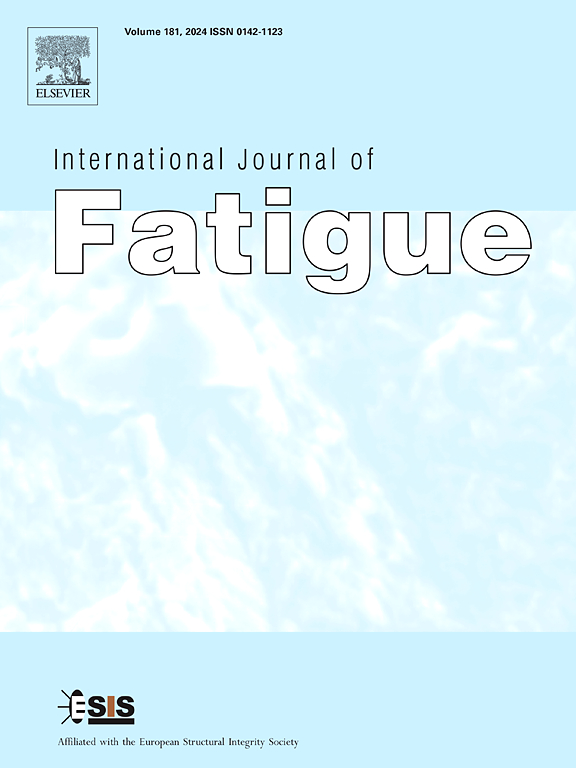Research on probability model and reliability of multiaxial fatigue life based on Huffman model
IF 5.7
2区 材料科学
Q1 ENGINEERING, MECHANICAL
引用次数: 0
Abstract
Various uncertainties are widely presented in engineering problems, such as material properties, loads, geometries, etc. Research has indicated that there is a significant relationship between the dispersion of fatigue life and the material properties. Therefore, it is necessary to study the effect of the parameter distribution of the material on the uncertainty of fatigue life. However, there are very few studies involving the distribution of fatigue performance parameters {σf’, εf’} of materials. In this paper, a probability framework of multiaxial fatigue life prediction based on the uncertainty of material parameters {σf’, εf’} was established, which focuses on quantifying the distribution of material parameters {σf’, εf’} based on the Huffman model. Next, based on the Fatemi-Socie (FS) model and the distribution of strain life parameters {σf’, εf’}, the probability field of Δγeq/2-N curves were obtained, and experimental data were distributed around the predicted average life. In addition, a time-dependent multiaxial fatigue reliability analysis method based on the Palmgren-Miner rule and P-Δγeq/2-N was derived, and the reliability curves were obtained under four multiaxial loading cases.
基于 Huffman 模型的多轴疲劳寿命概率模型与可靠性研究
工程问题中广泛存在各种不确定性,如材料特性、载荷、几何形状等。研究表明,疲劳寿命的分散性与材料特性之间存在显著关系。因此,有必要研究材料参数分布对疲劳寿命不确定性的影响。然而,涉及材料疲劳性能参数{σf', εf'}分布的研究很少。本文建立了基于材料参数{σf', εf'}不确定性的多轴疲劳寿命预测概率框架,重点是基于 Huffman 模型量化材料参数{σf', εf'}的分布。接着,基于 Fatemi-Socie(FS)模型和应变寿命参数 {σf', εf'} 的分布,得到了 Δγeq/2-N 曲线的概率场,实验数据分布在预测的平均寿命周围。此外,基于 Palmgren-Miner 法则和 P-Δγeq/2-N 方法,推导了与时间相关的多轴疲劳可靠性分析方法,并得到了四种多轴加载情况下的可靠性曲线。
本文章由计算机程序翻译,如有差异,请以英文原文为准。
求助全文
约1分钟内获得全文
求助全文
来源期刊

International Journal of Fatigue
工程技术-材料科学:综合
CiteScore
10.70
自引率
21.70%
发文量
619
审稿时长
58 days
期刊介绍:
Typical subjects discussed in International Journal of Fatigue address:
Novel fatigue testing and characterization methods (new kinds of fatigue tests, critical evaluation of existing methods, in situ measurement of fatigue degradation, non-contact field measurements)
Multiaxial fatigue and complex loading effects of materials and structures, exploring state-of-the-art concepts in degradation under cyclic loading
Fatigue in the very high cycle regime, including failure mode transitions from surface to subsurface, effects of surface treatment, processing, and loading conditions
Modeling (including degradation processes and related driving forces, multiscale/multi-resolution methods, computational hierarchical and concurrent methods for coupled component and material responses, novel methods for notch root analysis, fracture mechanics, damage mechanics, crack growth kinetics, life prediction and durability, and prediction of stochastic fatigue behavior reflecting microstructure and service conditions)
Models for early stages of fatigue crack formation and growth that explicitly consider microstructure and relevant materials science aspects
Understanding the influence or manufacturing and processing route on fatigue degradation, and embedding this understanding in more predictive schemes for mitigation and design against fatigue
Prognosis and damage state awareness (including sensors, monitoring, methodology, interactive control, accelerated methods, data interpretation)
Applications of technologies associated with fatigue and their implications for structural integrity and reliability. This includes issues related to design, operation and maintenance, i.e., life cycle engineering
Smart materials and structures that can sense and mitigate fatigue degradation
Fatigue of devices and structures at small scales, including effects of process route and surfaces/interfaces.
 求助内容:
求助内容: 应助结果提醒方式:
应助结果提醒方式:


